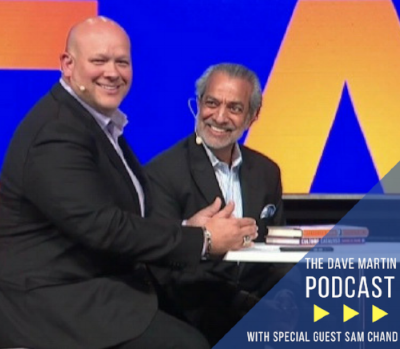BLEEDERSHIP

This week, while at the LEAD Conference, I had the opportunity to talk with Leadership Expert, Dr. Sam Chand. Dr. Chand is a long-time friend, and lends his valued and experienced voice to the discussion of leadership and success. Join us on this week’s podcast, DAVE MARTIN’S SUCCESS MADE SIMPLE to hear the entire conversation.
Dr. Dave: What is leadership?
Dr. Chand: Leadership is having people follow you. Success comes from honor, respect,
reciprocity, and creating a healthy culture in your organization. Success is acting nice. Success is being kind. Success is returning a phone call or responding to an e-mail. Success is showing up.
Success is being there on time. Success is writing a thank you note. When people talk about
success, it’s much more than a list of accomplishments. It’s what your mama taught you--say please, thank you, you’re welcome, and be kind to people.
People must like you before they will go along with you. There is great value in the ‘likability factor.’ Some people say, “I don’t care what people think about me.” But we should care. Success is not that complicated. It is made of these basic ingredients. Just as millions of books are written from 26 letters, and symphonies are composed from octaves of 12 notes, and masterpieces are painted from the few basic colors, so success has a very broad range, but is still composed of these basic ingredients. Be a good human being, and have integrity.
Dr. Dave: You speak to leaders across all types of organizations. What is the main premise for your book, Leadership Pain?
Dr. Chand: This book explores the answer to the question that I hear so often from executive leaders, “What is the main difference between the CEOs in a large company and the CEOs in a small company?” As I looked at organizations and companies, I realized that the factor that set them apart was not administration, location, finances, staffing, or even leadership style. The difference is how much pain are they are willing to handle. The whole book is built on one simple sentence. Your rise to the top is controlled by the level of pain you can handle. The more pain you can handle, the higher you rise. Some people call it ‘leadership’; I call it ‘bleedership.’ If you are not bleeding, you are not leading. The higher you go, the more pain there is.
Dr. Dave: Is there a way to learn how to take more pain as a leader?
Dr. Chand: Yes. One way is to make up your mind that this is simply the path of leadership. Don’t whine. Understand that this is what you signed up to do. If you don’t want it, and don’t want the pain that comes with it, then quit, get out, do something else.
Also, one of the most helpful means of dealing with leadership pain is to have a pain partner. A pain partner is someone who will listen – not to give advice, not to consult, correct, or straighten you out – but just to listen to you talk. Everyone needs someone who is your pain partner and who does not judge you.
Dr. Dave: Does your pain partner need to be in the same type of work as you?
Dr. Chand: No. It can be anyone who is trustworthy and can keep confidences.
Dr. Dave: How do you find the people who have discretion in leadership?
Dr. Chand: I wish I knew! Finding people of discretion is not that easy. Trust is the currency of human interaction, and when someone gives you their trust, they give you the most important commodity they have. So be a person of discretion, and when you are known for that, I think you will be successful in life.
Dr. Dave: You help a lot of organizations with longtime leadership to make transitions. What are the keys to making smooth transitions when there are leadership changes?
Dr. Chand: Succession planning is not about a new leader coming in and the present leader leaving. It’s never about two people.
1. Succession planning is about the sustainability and the viability of the organization. Good succession planning focuses on the organization first, then leaders next.
2. Leaving is harder than coming in, but the longer you stay, the harder you make the transition. Leave while you are in good standing, while everyone still loves you, and while you are at the top of your game.
As a leader, pay more attention to the viability and sustainability of your organization, and
think secondly about yourself.
For more information and wisdom from Dr. Sam Chand, find his books on Amazon.com.